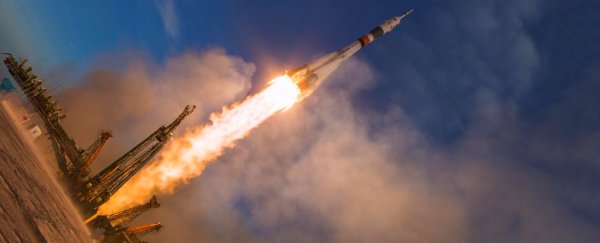The first Russian rocket to fly with people since a harrowing failure two months ago blasted off Monday morning in a successful return to flight.
The Soyuz rocket and spacecraft launched at 5:31 pm local time (6:31 am Eastern time) with three people on board - NASA astronaut Anne C. McClain, Canadian astronaut David Saint-Jacques and Russian cosmonaut Oleg Kononenko - en route to the International Space Station from a remote launch site in Kazakhstan.
"A great launch," a NASA commentator said during a live stream of the event.
Six hours later, the spacecraft reached the station and docked with it, culminating a successful mission. The crew is expected to stay on the station until June.
In October, a Soyuz rocket malfunctioned when one of its side boosters failed to separate properly and slammed into the rocket.
That triggered an automatic abort of the spacecraft, carrying the two-member crew on a wild ride nearly to the edge of space before they fell safely back to the ground.
Roscosmos, the Russian space agency, has since said the failure was caused by a "deformed sensor" damaged during the rocket's assembly. Instead of delaying the next flight with crews on board, the agency actually moved it up - a decision that NASA approved.
In a recent interview, NASA Administrator Jim Bridenstine said Roscosmos has been "very transparent" about the investigation into the malfunction.
"They have shared with us all the data we need to be comfortable and confident that we understand the problem and that it has been resolved," he said.
NASA has been forced to rely on Russia for transportation to the space station since the shuttle retired in 2011. While there are several systems capable of flying cargo and supplies to the orbiting laboratory, the Soyuz is the only vehicle able to fly people there.
After the failure, officials in the United States and Russia said they had a sense of urgency to get it back up and running.
The malfunction did little to lessen McClain's resolve. "I would have gotten on the Soyuz the next day," she recently told reporters.
She said she was confident that Roscosmos had fixed the problem by asking "the three important questions: What happened? Why did it happen? And how do we ensure it doesn't happen again? Nobody was going to give the green light until those three questions were answered."
McClain, an Army lieutenant colonel and helicopter pilot, was chosen to be an astronaut by NASA in 2013.
This was the first time she has been picked for a mission to space.
When she was 3 years old, she told her mother, "I want to be an astronaut," she recalled in an Army video.
"She never told me that I couldn't."
On Monday, NASA also announced that the astronauts on the aborted mission in October, NASA's Tyler N. "Nick" Hague and Alexey Ovchinin of Roscosmos, were scheduled to fly again February 28.
2018 © The Washington Post
This article was originally published by The Washington Post.
